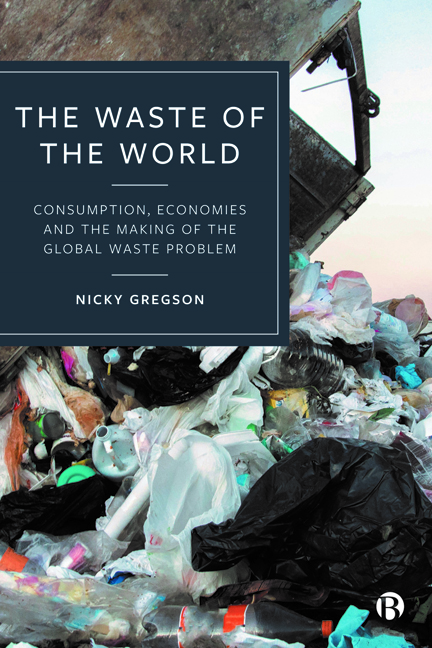Book contents
- Frontmatter
- Contents
- Acknowledgements
- Preface
- 1 The Global Waste Problem and How to Think about It: Or, how to understand the ‘too much waste’ problem
- 2 Discard, Social Order and Social Life: Or, discard is foundational to understanding waste
- 3 Consumption, Consumer Practices and Consumer Discard: Or, how consumer discard relates to economies
- 4 Conduits, Value Regimes and Valuation: Or, following consumers’ discarded things
- 5 Recommodifying Discard: Or, the challenges of turning discard into an economic good
- 6 Waste, Money and Finance: Or, how turning discard into waste turns waste into an energy resource and an asset
- 7 Future Directions: Or, rewiring waste through the three Ds (decarbonization, digital and discard)
- Notes
- References
- Index
7 - Future Directions: Or, rewiring waste through the three Ds (decarbonization, digital and discard)
Published online by Cambridge University Press: 18 January 2024
- Frontmatter
- Contents
- Acknowledgements
- Preface
- 1 The Global Waste Problem and How to Think about It: Or, how to understand the ‘too much waste’ problem
- 2 Discard, Social Order and Social Life: Or, discard is foundational to understanding waste
- 3 Consumption, Consumer Practices and Consumer Discard: Or, how consumer discard relates to economies
- 4 Conduits, Value Regimes and Valuation: Or, following consumers’ discarded things
- 5 Recommodifying Discard: Or, the challenges of turning discard into an economic good
- 6 Waste, Money and Finance: Or, how turning discard into waste turns waste into an energy resource and an asset
- 7 Future Directions: Or, rewiring waste through the three Ds (decarbonization, digital and discard)
- Notes
- References
- Index
Summary
Having begun this book with my motivations for writing it, I end it by underlining its messages or implications for policymakers and for each and every one of us as consumers. At one level they can be stated simply and starkly: we cannot solve what is called the ‘global waste problem’ by seeking to eliminate or get rid of waste. Neither will we make significant inroads into the problem by focusing on the stuff of waste, or discrete categories of waste: food waste, packaging waste, e-waste and the like. This is because waste is not just material, physical stuff. It is more fundamental than that. It is a category of value and a way of ordering lives. We will never, therefore, get rid of waste; rather, it's a category that will continue to be made and remade in the course of everyday life.
It is also important to acknowledge that the category of waste also includes stuff of negative value – the kind of stuff that is harmful to living organisms. I have said less about this kind of stuff in this book, but the examples are legion: radioactive waste, asbestos, PCBs, clinical waste, for example. This is important to acknowledge because these wastes require specific technical waste management solutions to deal with them safely, and at least one of those wastes currently does not have such a solution. However much it might wish otherwise, humanity cannot do away with these types of wastes. Some, like radioactive waste and asbestos, are in the ‘forever’ category; they are a legacy of previous generations’ approach to the material world and a potent reminder that what is made never goes away but only transforms state, that is, it continues to exist in material form in some way or other. Others, notably clinical waste, are an inevitable effect of the ongoing need to care safely for life, but the same laws apply.
We have to proceed, therefore, by recognizing that there will always be waste and that certain wastes will always need to be managed appropriately.
- Type
- Chapter
- Information
- The Waste of the WorldConsumption, Economies and the Making of the Global Waste Problem, pp. 164 - 179Publisher: Bristol University PressPrint publication year: 2023



